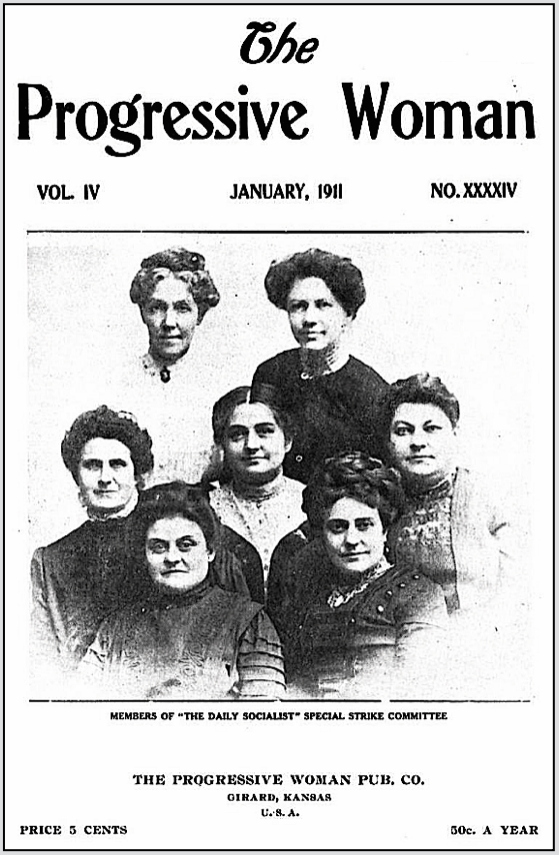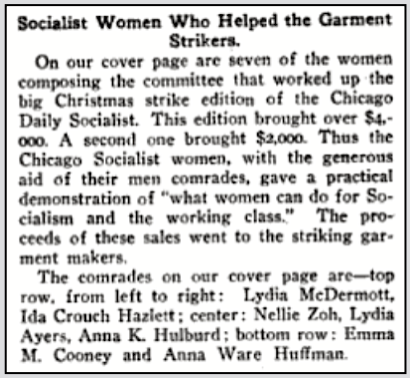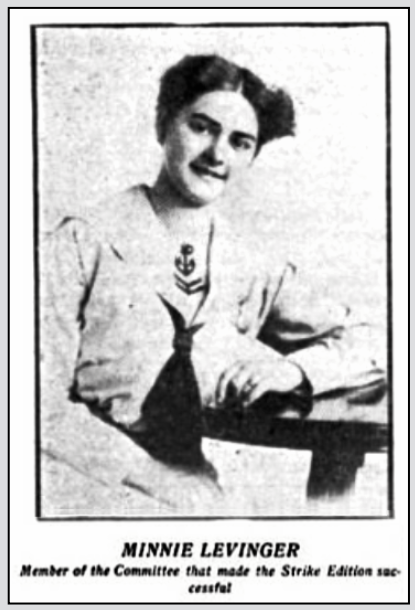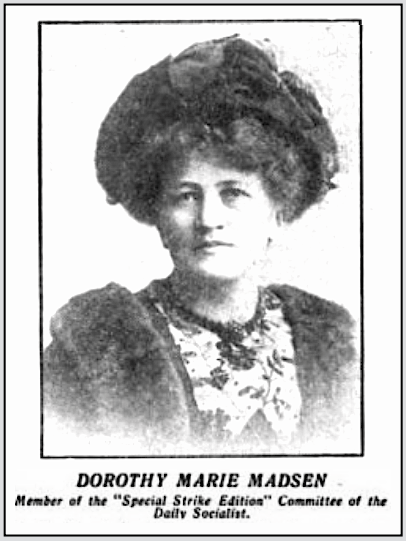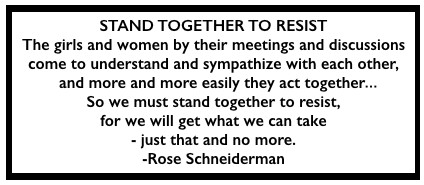 ———-
———-
Hellraisers Journal – Thursday January 12, 1911
Chicago, Illinois – Socialist Women Stand with Striking Garment Workers
From The Progressive Woman of January 1911:
———-
The Chicago Garment Workers’ Strike
ANNA A. MALEY
Workers of the world, unite! This is in deed the golden rule of labor—a rule that in the fullest application will give us one day a united workers’ world
Working class need is the great unifier; and so in the Chicago garment makers’ strike there stand 41,000 workers, comprising nine nationalities. The branches of the trade included are cutters, trimmers, coat makers, pants makers, vest makers and buttonhole makers.
And the particular form of chain which galled these workers?—
Unbearable slave-driving by foremen who were paid a bonus for getting the greatest amount of work done for the least pay.
Fines—for spotted garments; for lost needles, spools—60 cents being the charge for a spool, full or empty; for failure to punch the time check, for every so slight discoloration to a garment in pressing for ever so slight cutting into the garment line, cases being on record where the full price of the garment was charged. Fines have even been imposed for a too liberal use of soap. The price paid for work had been systematically reduced. Cutters received fifty cents for the cutting of a suit. “Bonused” foreman piled five or six layers of cloth before the cutter and thus five or six suits were cut at once—for fifty cents. The extra inch of cloth was taken off, so that cutters must spend precious minutes in notching to color and stripe.
In the largest house involved, during rush seasons, the floor men were instructed to shut off the water before and afternoon, so that the girls should find no occasion to leave their work. These same girls, driven like machines during the day, often bought hundreds of needles which they threaded at home at night.
Work, work, work,
Till the brain begins to swim,
And work, work, work,
Till the eyes grow heavy and dim.
“Tis O to be a slave,
Along with a barbarous Turk,
Where woman has never a soul to save,
If this is Christian work!”Then during the stock season, the girls must often sit in the shop seven long hours with out work.
These, and scores of pettier abuses drove the Chicago garment workers to demand the right to form a union—to bargain collectively. Their masters refuse to recognize the workers’ union—although the masters have a union known as the Clothing Manufacturers’ Association.
Hart, Schaffner & Marx, the largest firm involved, do not belong to the association—not because they do not recognize the benefits of unionism, but because they are strong enough to beat the whole association and dictate the rules of the game.
This firm, whose treatment of their employes suggest ethical standards about even with those of—say the crocodiles, have the impudence to speak as follows through their president, Harry Hart, on the moral wrong of trades upon unionism:
“The closed shop, the so-called recognition of the union, which means that all working people must not be included in such a trust shall be discriminated against, is criminal, unethical and illegal. It is impossible in our industry. Its introduction would force us into some other line of business. Many men are in our employ who do not want to join the union, and have good reasons for not wanting to. Must we refuse to let these work? If we granted a closed shop, beginners, no matter how apt for the work, would be forbidden the chance to learn because of a system which had been declared by the supreme court to be a combination in restraint of trade.”
Not to save the pocket of the firm, mind you, but to protect the constitutional rights of poor workers, are Hart, Schaffner & Marx in this fight. Of course, there are no classes for the bosses are on the side of the workers —at least, they are on the side of the “good” workers who want individual bargaining in a trade where there are fifty-six divisions to a pair of pants, more than sixty to a coat and twenty to a vest.
All in time we will quit the “bargaining” business, both individual and collective. All in good time we will awake to the fact that we are the rightful owners.
“Who is the owner?—
The slave is the owner,
And always was. Pay him!”In the meantime, “the devil may pipe to his own.” The supreme court decisions serve these tyrant masters just as do the clubs of the policemen. There were 325 strikers arrested up to December 13th. Bell Squire, reciting the brutalities of the law in the Chicago Tribune of December 11th, says:
What sort of war is this, anyway, in which only the protected may carry weapons—in which only one side and its allies have claim to protection? For surely this is what it amounts to!
Peaceful picketing is war without weapons —war without a show of strength.
It is futile, uncivilized, unfair, unjust.
The strike leaders have brought out of conference several proposals for settlement. These did not include recognition of the union and the rank and file of the strikers have rejected them.
The Socialists of Chicago have not been passive onlookers. Ten thousand copies of the International Socialist Review sold on the street by the strikers netted their fund $700. Much of the present article is drawn from one by R. Dvorak in the December Review, and the January issue will be devoted almost wholly to the strike.
The Chicago Socialist has given daily advertising to it and a special edition sold on the streets by the Socialist and union women brought $3,000 to strike fund. A larger special edition is now in preparation.
The Chicago unions are supporting the strike, but we must remember that $100,000 a week would mean but a dollar each to the strikers and their families.
So, comrade, where is your dollar? If you can contribute a dozen loaves of bread to those who are on the firing line in your fight and mine, send the price to the National Socialist headquarters, 18o Washington street, Chicago.
For surely “Workers of the world, unite” is not with us an empty sentiment, but a working program, to which we pledge freely our love, our labor and the little money that we may be able to give.
[Emphasis added.]
~~~~~~~~~~~~~~~~~~~~~~
SOURCES & IMAGES
Rose Schneiderman Quote, Mar 20, NY Independent p938, Apr 1905
https://babel.hathitrust.org/cgi/pt?id=coo.31924106546991&view=2up&seq=962
The Progressive Woman
(Girard, Kansas)
(Mar 1909 to May 1911)
(some issues missing)
https://books.google.com/books?id=Zo1EAQAAIAAJ
Cover-Jan 1911
https://play.google.com/books/reader?id=Zo1EAQAAIAAJ&printsec=frontcover&pg=GBS.RA22-PA16
-page 2: Names of women in cover photo.
https://play.google.com/books/reader?id=Zo1EAQAAIAAJ&printsec=frontcover&pg=GBS.RA23-PA2
-page 3: “Chicago Garment Workers’ Strike”
-by Anna A. Maley
https://play.google.com/books/reader?id=Zo1EAQAAIAAJ&printsec=frontcover&pg=GBS.RA23-PA3
See also:
Tag: Chicago Garment Workers Strike of 1910
https://weneverforget.org/tag/chicago-garment-workers-strike-of-1910/
From Life and Labor (WTUL) of January 1911
“History of the Garment Workers’ Strike” -with photos
https://babel.hathitrust.org/cgi/pt?id=uc1.b3859487&view=2up&seq=14
Dec 11, 1910-Chicago Tribune:
“On Strike with Strikers; How Girl Pickets Work.
-by Belle Squire, Parts I & II
https://www.newspapers.com/clip/67475631/dec-11-1910-chicago-tribune-on-strike/
https://www.newspapers.com/clip/67476340/dec-11-1910-chicago-tribune-on-strike/
Belle Squire
https://en.wikipedia.org/wiki/Belle_Squire
The Chicago Daily Socialist (1906-1912)
-for Garment Workers Strike, see issues Oct 1910 – Feb 1911
https://www.marxists.org/history/usa/pubs/chicago-daily-socialist/index.htm
~~~~~~~~~~~~~~~~~~~~~~~~~~~~~~~~~~~~~~~~~~~~~
Bread and Roses – Bronwen Lewis

